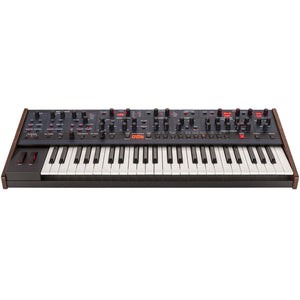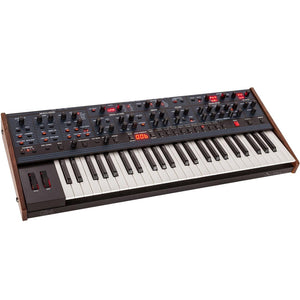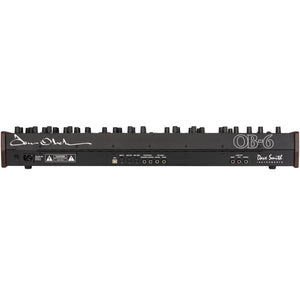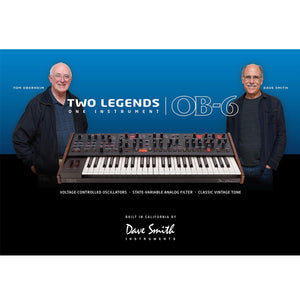Your Cart is Empty




$5,199.00$5,599.00
DSI-2700
Sequential OB-6 -6-Voice Polyphonic Analog Synthesizer
Type: Keyboard Synthesizers
6-Voice Polyphonic Analog Synthesizer
The OB-6 is a polyphonic 6 voice analog synth inspired by the Oberheim SEM. Each voice features 2 discrete oscillators, plus a sub-oscillator. The OB-6 is all about recapturing the magic and sound of the Oberheim SEM and adding to it with Dave Smith's modern brilliance in creating analog keyboard synthesizers for today's electronic music-production market. This is a once-in-a-lifetime opportunity to own a synth created by both Tom Oberheim and Dave Smith!
FEATURES
Two Legends. One Instrument-
The OB-6 is a once-in-a-lifetime collaboration between the two most influential designers in poly synth history, Dave Smith and Tom Oberheim. The OB-6 takes the classic bold Tom Oberheim sound — with its true voltage-controlled oscillators, 2-pole filter, and amplifiers — and adds modern enhancements such as studio-quality effects, a polyphonic step sequencer, an arpeggiator, and more. No other modern analog poly synth can boast such a pedigree or such a massive, in-your-face sonic signature.
-
The OB-6 sound engine is inspired by Tom’s original SEM, the core of his acclaimed 4-voice and 8- voice synthesizers. It features two discrete voltage-controlled oscillators (plus sub-oscillator) per voice with continuously variable waveshapes (sawtooth and variable-width pulse, plus a triangle wave on oscillator 2). The classic Oberheim-inspired 2-pole, state-variable, resonant filter provides low-pass, high-pass, band-pass, and notch functionality. Voltage-controlled amplifiers complete the all-analog signal path.
-
The dual effects section provides studio-quality reverbs, delays (standard and BBD), chorus, flangers, and faithful recreations of Tom’s original phase shifter and ring modulator. While the effects themselves are digital, with 24-bit, 48 kHz resolution, a true bypass maintains a full analog signal path.
-
Also present is X-Mod, which expands the tonal palette and makes it easy to create dramatic and unconventional sounds. Modulation sources are filter envelope and oscillator 2, both with bi-polar control. Destinations include oscillator 1 frequency, oscillator 1 shape, oscillator 1 pulse width, filter cutoff, and filter mode. The polyphonic step sequencer allows up to 64 steps and up to 6 notes per step. You can create sequences polyphonically, with rests, and sync to an external MIDI clock. The full-featured arpeggiator can be synced to an external MIDI clock as well. Unison mode features configurable voice count (1-6 voices), chord memory, and key modes.
-
The knob-per-function front panel puts virtually all OB-6 functions at your fingertips. Included are 500 permanent factory programs and 500 rewritable user programs. Turning on the Manual button enables live panel mode, in which the sound of the OB-6 switches to its current front panel settings. In this state, what you see is what you hear.
-
This analog powerhouse is packed into a four-octave, semi-weighted keyboard with velocity and channel aftertouch, making it perfect for a stage or studio.
SPECIFICATIONS
OSCILLATORS-
Two discrete VCOs per voice
-
Continuously variable wave shape (sawtooth and variable-width pulse, plus triangle on oscillator 2) per oscillator
-
Pulse width per oscillator
-
Hard sync: oscillator 1 syncs to oscillator 2
-
Square wave sub-octave generator (oscillator 1) per voice
-
Low-frequency mode (oscillator 2)
-
Keyboard tracking on/off (oscillator 2)
-
Oscillator detune amount for increased tuning instability, from subtle to extreme
-
Oscillator 1 amount
-
Oscillator 1 sub-octave amount
-
Oscillator 2 amount
-
White noise amount
-
Two-pole, resonant, filter per voice with low-pass, high-pass, band-pass, and notch functionality inspired by the original Oberheim SEM filter
-
Bi-polar filter envelope amount
-
Velocity modulation of envelope amount
-
Keyboard tracking: off, half, full
-
Four-stage (ADSR) envelope generator
-
Velocity modulation of envelope amount
-
Four-stage (ADSR) envelope generator
-
Velocity modulation of envelope amount
-
Five wave shapes: sine, sawtooth, reverse sawtooth, square, and random (sample and hold)
-
Clock sync (internal or external MIDI clock)
-
Initial amount
-
Mod destinations: oscillator 1 frequency, oscillator 2 frequency, oscillator 1 and 2 pulse width, filter cutoff, filter mode, amp
-
Sources: filter envelope (bi-polar) and oscillator 2 (bi-polar)
-
Destinations: oscillator 1 frequency, oscillator 1 shape, oscillator 1 pulse width, filter cutoff, filter mode, normal to bandpass filter
-
Source: channel (mono) aftertouch with bi-polar amount
-
Destinations: oscillator 1 frequency, oscillator 2 frequency, LFO amount, amplifier envelope amount, filter envelope amount, filter mode
-
Master clock with tap tempo
-
BPM control and display
-
MIDI clock sync
-
Selectable note value: 16th note, 8th note triplet, 8th note, dotted 8th note, quarter note
-
One, two, or three octave range
-
Up, down, up/down, random, and assign modes
-
Polyphonic step sequencer with up to 64 steps and rests
-
Stereo analog distortion
-
Dual, 24-bit, 48 kHz digital effects, including: reverb (room, hall, plate, spring), delay (full bandwidth digital delay and emulated bucket brigade), chorus, flanger, phase shifters, and ring modulator
-
Delay sync
-
True bypass maintains fully analog signal path when digital effects are off
-
Full-sized, semi-weighted, 4-octave keyboard with velocity and aftertouch
-
Backlit pitch and mod wheels
-
Spring-loaded pitch wheel with selectable range per program (1 to 12 semitones up and down)
-
Transpose controls for an 8-octave range
-
Hold switch latches held notes on
-
Polyphonic portamento
-
Unison (monophonic) mode with configurable voice count, from one to all six voices, chord memory, and key modes
-
Manual switch: when on, the front panel is live; what you see is what you hear
-
500 user and 500 factory programs in 10 banks of 100 programs each
-
Direct program access, including single-button access to the current set of 10 programs
-
Left/mono and right audio outputs (2 x 1/4” phone jack)
-
Headphone output (stereo, 1/4” phone jack)
-
MIDI in, out, and thru ports
-
USB for bidirectional MIDI communication
-
Filter cutoff expression pedal input
-
Volume expression pedal input
-
Sustain footswitch input
-
Sequencer start/stop footswitch input
-
IEC AC power inlet for internal power supply
-
Operates worldwide on voltages between 100 and 240 volts at 50 to 60 Hz; 30 watts maximum power consumption
-
31.8” L x 12.7” W x 4.6″ H (80.7 cm x 32.3 cm x 11.7 cm)
-
20 lbs (9.5 kg)
-
Walnut end panels




